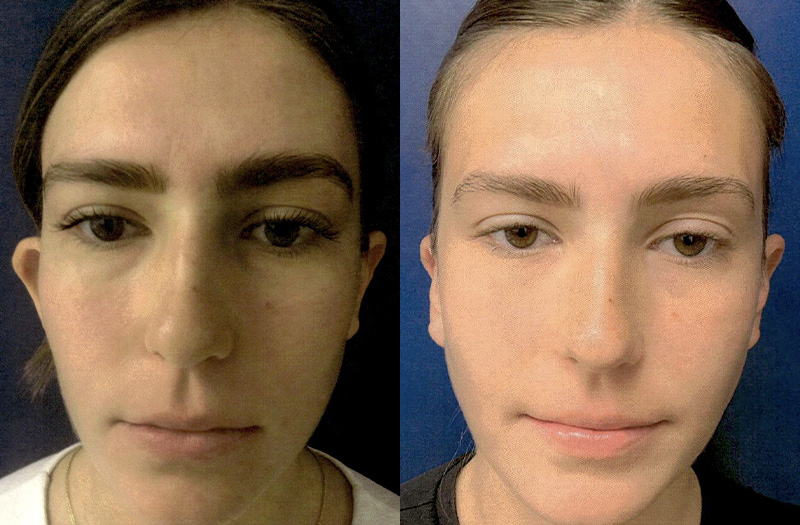Quick Links
What is an Otoplasty/Ear Pinning Surgery?
Ear surgery, or otoplasty, can help to improve the shape, position, or proportion of the external ear. Otoplasty can be done to correct a defect in the ear structure that is present at birth. The cosmetic and reconstructive surgery can also be used to treat misshapen ears caused by injury. Improving overly large or protruding ears or disfigured or prominent ears can help adults and children with self-image and confidence. For this reason, the procedure is often performed on both adults and children to create a more flattering look and a more natural shape. To determine which treatment plan and surgical techniques are right for you, Falcon Plastic Surgery has offices in Monroeville and Natrona Heights ready to serve patients.
Who is a Candidate for Cosmetic Ear Surgery?
Most patients who have protruding ears are good candidates for otoplasty. The procedure can be performed on young children as long as the ear cartilage has completed development; this can occur as young as about five years old. Often, parents choose otoplasty for their children so they can avoid bullying by their peers when they start school. Before otoplasty, you should be generally healthy overall. Our experienced plastic surgeon, Dr. Falcon, will examine your ears and review your health history to determine whether you are a good candidate for the surgery.

“Dr. falcon and his staff have been caring for me over 20 years. He is caring compassionate knowledge and goes above and beyond for every patient.”
Benefits of Otoplasty
When you come into Falcon Plastic Surgery, you can expect to take advantage of a few different benefits, including the following:
- More balanced appearance: When your ears are more proportional to the rest of your face, you’ll notice a you have a more balanced and harmonious facial appearance overall.
- Boost in confidence: Most patients who come to us for an otoplasty procedure notice a significant boost in their confidence. When you love what you see when you look in the mirror, your self-esteem with increase exponentially.
- Long-lasting results: The results of an otoplasty are typically permanent. You may see some slight changes to your ears as you age, but they are typically subtle.
What to Expect During An Otoplasty
To start your otoplasty procedure, we’ll begin by administering local anesthesia to ensure you’re comfortable. Dr. Falcon will then make an incision along the back of the ear or in the folds of the ear. He will then remove tissue, reshape the ear, and if necessary, pin the ear closer to your head. He will then repeat the process on the other ear. All incisions will then be closed, and you’ll be ready to start the recovery process. The otoplasty procedure can take anywhere from 1-3 hours, depending on how complex it is.
What is Recovery Like After Otoplasty?
Most ear surgeries are completed with just local anesthetic, meaning that you will be awake throughout the procedure but won’t feel the pain. Despite not using general anesthesia, it’s possible that you will still feel groggy after surgery, so it’s important to have someone drive you home after. Following your otoplasty, you should take care to keep your head elevated as much as possible. This can help alleviate any swelling. You will have bandages and surgical dressings or headbands placed over the ears and should care for them as directed. Pain medication or other medications may be prescribed to keep you comfortable. Most patients need 5-7 days away from work, school, or other normal routines. Healing usually takes about six weeks to complete, but you should notice your results immediately following surgery. Dr. Falcon can offer advice regarding caring for your ears, returning to strenuous activity like exercise, and other concerns after your follow-up appointments.

Dr. Christopher Falcon
Board certified Plastic, Reconstructive Hand surgeon
Dr. Christopher Falcon’s journey to becoming a plastic surgeon began as a child, inspired by accompanying his father on hospital rounds. Following his education, he pursued a five-year general surgery residency at the University of Medicine & Dentistry School of Osteopathic Medicine of New Jersey and a three-year fellowship in plastic, reconstructive, and hand surgery at New York College of Osteopathic Medicine in New York City.
After gaining experience practicing with top cosmetic surgeons in New York City, Dr. Falcon purchased Falcon Plastic Surgery from his father in 2017. Since then, he has maintained a family-owned practice, offering accessible plastic surgery with a “less-is-more” approach, focusing on enhancing natural features in a comfortable and approachable environment.

Is Ear Surgery Covered by Health Insurance?
Otoplasty is typically considered cosmetic and is therefore not covered by health insurance plans. In some less common cases, otoplasty is performed to correct a congenital deformity or abnormality or the results of an injury. For these patients, health insurance may cover some of your costs. To be sure, you should contact your health insurance provider prior to your otoplasty. If you have any questions regarding insurance or financing, feel free to contact our office.
Ear Surgery FAQs
Can I drive after ear surgery?
How do you sleep after ear surgery?
Is otoplasty a safe procedure?
How long after otoplasty can I exercise?
Why do my ears stick out?
Will my insurance cover otoplasty?
Does otoplasty affect hearing?
How long is otoplasty surgery?
How long should I wear headband after otoplasty?
Is otoplasty permanent?
Schedule a Consultation
To learn more about otoplasty, schedule a consultation with Dr. Falcon. Call our office at (724-226-3900) or contact us online to get started. Falcon Plastic Surgery’s Monroeville Office is conveniently located 16 miles from Downtown Pittsburgh and 10 miles from Delmont.
State-of-the art, on site surgical suite located in Natrona Heights, PA
Our suite is certified with the highest level of accreditation by the American Association for Accreditation of Ambulatory Surgery Facilities, Inc. (AAAASF).
Learn More




